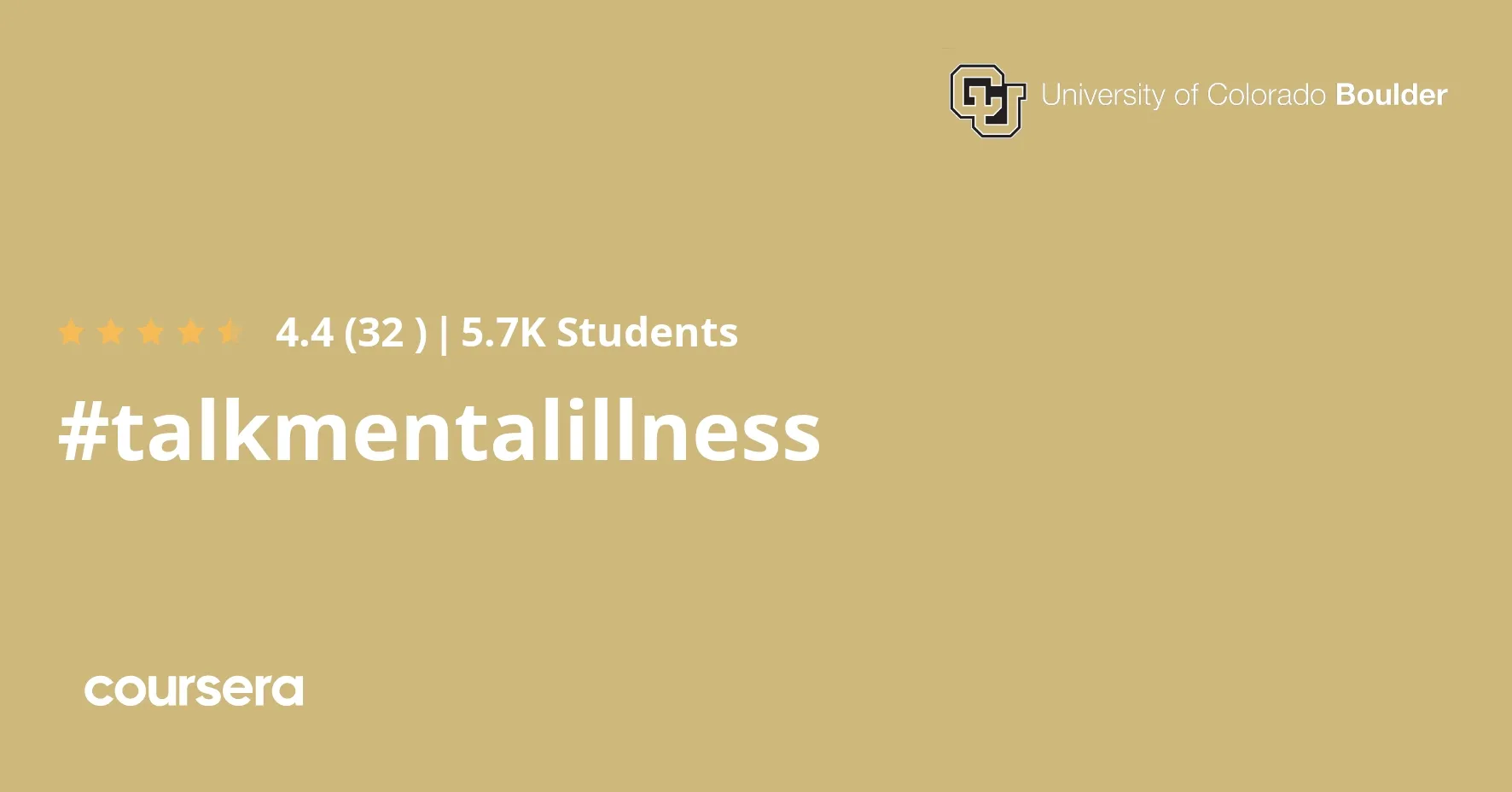
#talkmentalillness 
For over 15 years, Professor and Mental Health Researcher and Educator has been leading the field in mental health research and treatment. In response to the unprecedented mental health challenges of 2020, they initiated a field-wide call to action, resulting in the #TalkMentalIllness course. Through this course, they spoke to over 30 experts to discuss the causes and treatments of mental illness, the stigma surrounding it, and the systemic inequality in mental health treatment. ▼
ADVERTISEMENT
Course Feature
![]() Cost:
Cost:
Free
![]() Provider:
Provider:
Coursera
![]() Certificate:
Certificate:
Paid Certification
![]() Language:
Language:
English
![]() Start Date:
Start Date:
12th Jun, 2023
Course Overview
❗The content presented here is sourced directly from Coursera platform. For comprehensive course details, including enrollment information, simply click on the 'Go to class' link on our website.
Updated in [March 06th, 2023]
I am a professor and mental health researcher and educator, and I've been working in the field for over 15 years. Like so many of my colleagues, however, I was unprepared for the wave of mental health challenges that would face our society in 2020. From COVID-19 and the devastating economic impacts of the pandemic to racial justice protests, widespread natural disasters, our current cultural moment presents unprecedented mental health concerns, and particularly for marginalized communities. For this reason, I led a field-wide call to action for mental health research and treatment that resulted in this #TalkMentalIllness course. I had the opportunity to speak to over 30 experts from different domains in psychology research, practice, and popular public figures and to discuss the causes and cutting-edge treatments for many serious disorders, the stigma surrounding mental illness in our culture, systemic inequality in mental health treatment, and the mental health challenges of today.
#talkmentalillness curates the interviews from the Mental Health Experts series into an accessible learning experience that will help you have conversations about mental health. Talking about mental illness is both the content and desired outcome of this course, as you will use what you learn from my interviews with mental health experts to guide your own discussions about mental health challenges and treatments with family members, friends, colleagues, and other people in your life. The course will begin by presenting a core set of definitions for mental illness and analyzing the stigma associated with it. We will then apply these topics to specific psychological disorders, including anxiety and mood disorders, eating disorders, suicide, substance use, and psychosis. We will then consider how these issues disproportionately impact marginalized groups and communities of color. The course will conclude by considering innovative approaches to psychological treatments and how the pursuit and science of happiness inform mental health and wellness.
This course is part of a broader educational mission to share the science of mental illness with both students and the public, both locally and globally. I have designed and created it in collaboration with the Office for Academic Innovation and Libraries' Media Services Team at the University of Colorado Boulder.
- June Gruber
(Please note that we obtained the following content based on information that users may want to know, such as skills, applicable scenarios, future development, etc., combined with AI tools, and have been manually reviewed)
#TalkMentalIllness is an online course designed to help learners understand the causes and treatments of mental illness, as well as the stigma associated with it. Learners will gain an understanding of the various psychological disorders, such as anxiety and mood disorders, eating disorders, suicide, substance use, and psychosis. They will also learn about the disproportionate impact of mental illness on marginalized groups and communities of color. The course will also cover innovative approaches to psychological treatments and how the pursuit and science of happiness can inform mental health and wellness. Through this course, learners will gain the knowledge and skills to have meaningful conversations about mental health with family, friends, colleagues, and other people in their lives.
[Applications]
The #TalkMentalIllness course created by Professor June Gruber provides an accessible learning experience to help individuals have conversations about mental health. Through interviews with mental health experts, the course covers topics such as the causes and treatments of mental illness, the stigma surrounding mental illness, systemic inequality in mental health treatment, and the mental health challenges of today. It also provides an analysis of how mental illness disproportionately impacts marginalized groups and communities of color. The course is part of a broader educational mission to share the science of mental illness with both students and the public, both locally and globally. It is suggested that the application of this course can be used to help individuals have meaningful conversations about mental health and to help spread awareness of mental health issues.
[Career Paths]
The career paths recommended to learners of this course are:
1. Mental Health Counselor: Mental health counselors provide therapeutic services to individuals, couples, families, and groups to help them cope with mental health issues. They use a variety of techniques, such as cognitive-behavioral therapy, to help clients identify and address their mental health issues. Mental health counselors are in high demand, and the field is expected to grow by 22% over the next decade.
2. Mental Health Advocate: Mental health advocates work to raise awareness and reduce the stigma associated with mental illness. They work to educate the public about mental health issues and to promote access to mental health services. Mental health advocates are also involved in policy and legislative efforts to improve mental health services and access.
3. Mental Health Researcher: Mental health researchers study the causes, treatments, and prevention of mental illness. They use a variety of methods, such as surveys, interviews, and experiments, to collect and analyze data. Mental health researchers are in high demand, and the field is expected to grow by 15% over the next decade.
4. Mental Health Educator: Mental health educators work to educate the public about mental health issues. They use a variety of methods, such as lectures, workshops, and online courses, to teach people about mental health topics. Mental health educators are in high demand, and the field is expected to grow by 10% over the next decade.
[Education Paths]
For learners interested in pursuing a degree in mental health, there are a variety of paths available. Here are three of the most popular degree paths and their developing trends:
1. Psychology: Psychology is the study of the mind and behavior, and it is a popular degree path for those interested in mental health. Psychology degrees can range from a Bachelor's to a Doctorate, and the field is constantly evolving as new research and treatments are developed. In recent years, there has been an increased focus on the intersection of psychology and technology, with the development of virtual reality therapies and other digital treatments.
2. Social Work: Social work is a field that focuses on helping individuals, families, and communities to improve their lives. Social workers often work with people who are struggling with mental health issues, and a degree in social work can provide the skills and knowledge needed to help those in need. In recent years, there has been an increased focus on the intersection of social work and technology, with the development of online counseling and other digital treatments.
3. Mental Health Counseling: Mental health counseling is a field that focuses on helping individuals, families, and communities to improve their mental health. Mental health counselors often work with people who are struggling with mental health issues, and a degree in mental health counseling can provide the skills and knowledge needed to help those in need. In recent years, there has been an increased focus on the intersection of mental health counseling and technology, with the development of teletherapy and other digital treatments.
Pros & Cons

Insightful and enlightening personal accounts from guest speakers.

Challenging and inspiring course.

Varied topics from mental health experts.

Easy to understand.

Helps serve those with mental illness.

Great for professionals and anyone who wants to learn.

No introductory classes for engineering background.

Involvement of Temple Grandin made person feel physically sick.

Social media platforms not speaking to broader range of people.
Course Provider

Provider Coursera's Stats at AZClass
Discussion and Reviews
0.0 (Based on 0 reviews)
Explore Similar Online Courses

Tableau 10 for Data Scientists

Teaching Adult Piano

Python for Informatics: Exploring Information

Social Network Analysis

Introduction to Systematic Review and Meta-Analysis

The Analytics Edge

DCO042 - Python For Informatics

Causal Diagrams: Draw Your Assumptions Before Your Conclusions

Whole genome sequencing of bacterial genomes - tools and applications

Meditation

Mental Health First Aid Skills -

Workplace Mental Health: A Managers Ultimate Guide
 Related Categories
Related Categories
 Popular Providers
Popular Providers
Quiz
 Submitted Sucessfully
Submitted Sucessfully
1. What is the purpose of the #TalkMentalIllness course?
2. Who created the #TalkMentalIllness course?
3. What topics will be discussed in the #TalkMentalIllness course?
4. What is the goal of the #TalkMentalIllness course?


Start your review of #talkmentalillness